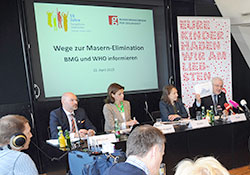Austria utilizes European Immunization Week to raise awareness among key target groups

BMG
European Immunization Week, 20–25 April 2015, provided the perfect backdrop for a WHO/Europe mission to Austria to highlight the successes and challenges associated with the country's efforts to eliminate measles and rubella. In collaboration with the Austrian Ministry of Health, the team of immunization experts, including incoming chair of the European Regional Verification Commission for Elimination of Measles and Rubella (RVC), Dr Günter Pfaff, helped raise public awareness about the importance of immunization and provided technical and policy advisory support, including recommendations on how to improve reporting of vaccination and surveillance data, monitor for congenital rubella syndrome, close immunity gaps and increase the involvement of important civil society organizations.
Progress
Through the implementation of national policies, such as an action plan for measles and rubella elimination and guidelines for vaccination of health workers, Austria is stepping up its prevention and control measures for measles and rubella, among other vaccine-preventable diseases. Progress has been aided by a high technical capacity and excellent coordination between the Ministry of Health, the National Verification Committee for Measles and Rubella Elimination and collaborating institutions such as the Austrian Agency for Health and Food Safety (AGES), and the National Reference Laboratory.
Closing immunity gaps
While there has been an impressive 23% increase in the uptake of the free measles and rubella vaccine in the country, outbreaks of measles are still occurring, with 114 cases of measles being reported in the country for 2014.
Age groups vulnerable to measles infection in Austria now also include adolescents and adults, many of whom were not fully vaccinated in childhood. Dr Pamela Rendi-Wanger, Director-General for Public Health and Medical Affairs at the Federal Ministry of Health of Austria, highlighted the shifting demographics in recent measles cases in the country, stating, "We can no longer say that measles is a childhood disease. The oldest patient is 64 years old this year. And that's not an isolated case."
"Responding to this increase requires new strategies, such as immunizing parents at the same time they bring in their children for vaccination," said Dr Abigail Shefer of WHO/Europe.
Role of health workers
In Austria, as in other parts of the European Region, health workers have been identified as a key target group in measles and rubella elimination efforts, due to their role as advocates and trusted providers of immunizations, and because they are themselves an under-immunized group. Dr Rendi-Wagner spoke of a worrying trend in recent measles outbreaks in the country, which have involved the spread of the disease within health care facilities. This highlights the need to ensure health workers are up-to-date with their own immunizations to protect themselves as well as vulnerable patients.
The WHO-RVC team therefore also met with front-line health workers, professional associations including the Austrian Midwives Association, patient advocates and hospital administrators.
Press conference
The mission concluded with a press conference attended by local and national media, which resulted in widespread coverage of the status of measles and rubella elimination in Austria in various media outlets.



